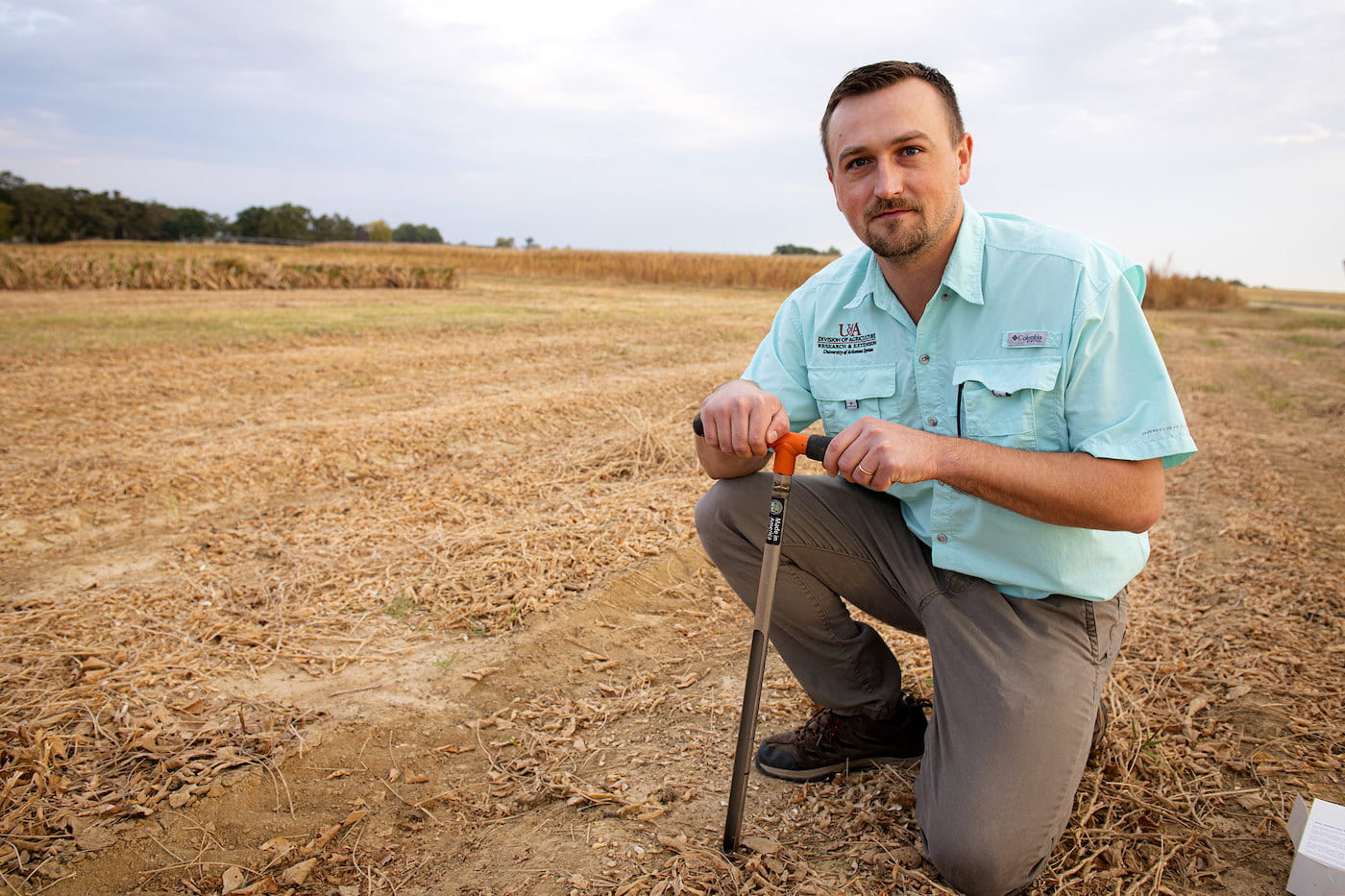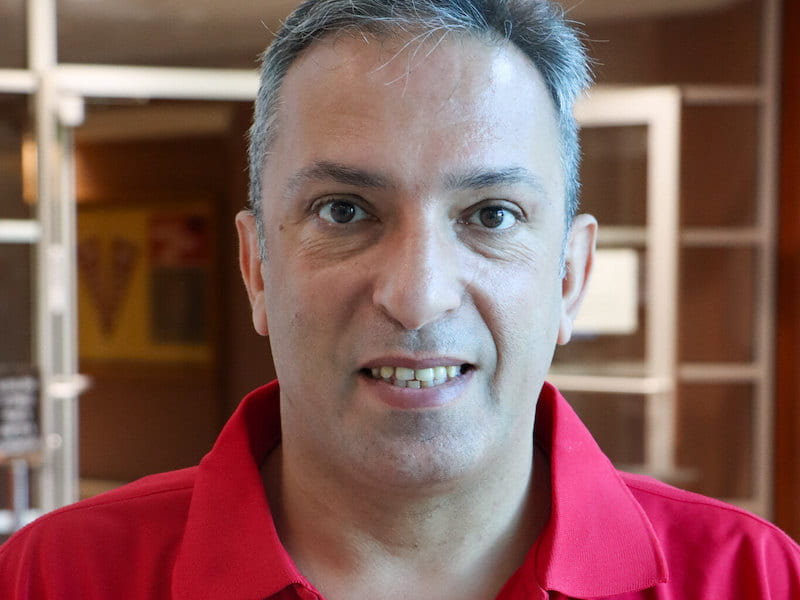May 2024 Arkansas Ag Research Report
IN THIS ISSUE:
- Find out who was recently named a Fellow of the American Association for the Advancement of Science.
- Low-frequency microwaves destroy weed seeds underground, prompting further studies as a broad-spectrum application.
- A new soil prediction model was developed to provide speedier options.
- What makes a chicken more water efficient than others, and why does it matter?
- Keith Berry Jr. joins the experiment station as its first-ever research development specialist.
Listen to This Newsletter 🎧
Big News
Researchers uncover what makes some chickens more water efficient than others
In the first scientific report of its kind, researchers in Arkansas showed that chickens bred for water conservation continued to put on weight despite heat stress that would normally slow growth.
Research by the Arkansas Agricultural Experiment Station indicates a specially bred line of chickens could save growers thousands of gallons of water and thousands of pounds of food each month without sacrificing poultry health.
Sara Orlowski, associate professor of poultry science, bred the divergent lines of chickens for water consumption. Sami Dridi, professor of poultry science specializing in avian endocrinology and molecular genetics, and Walter Bottje, professor of poultry science, were also part of the project funded by a USDA Sustainable Agriculture Systems multi-institutional grant led by the Center of Excellence for Poultry Science.
 Sara Orlowski, associate professor of poultry science, bred divergent lines of chickens for water consumption.
Sara Orlowski, associate professor of poultry science, bred divergent lines of chickens for water consumption.
Top Notch
Poultry scientist honored as a Fellow of the American Association for the Advancement of Science
For his contributions to science, Wayne Kuenzel was recently honored as a Fellow of the American Association for the Advancement of Science.
Kuenzel conducts research through the Arkansas Agricultural Experiment Station. He teaches courses on physiology and neuroendocrinology in the poultry science department of the Dale Bumpers College of Agricultural, Food and Life Sciences at the University of Arkansas, and is affiliated with the Center of Excellence for Poultry Science. The American Association for the Advancement of Science (AAAS) one of the world’s largest general scientific societies and publishes the Science family of journals.
USDA-NIFA grant supports microwave tech to zap weed seeds
Scientists and engineers with the Arkansas Agricultural Experiment Station are investigating the use of 915 MHz microwaves to neutralize a variety of weed seeds underground.
Nilda Burgos, professor of weed physiology and molecular biology, is the principal investigator of a nearly $300,000 Agriculture and Food Research Initiative grant from the U.S. Department of Agriculture’s National Institute of Food and Agriculture, with additional support from The Cotton Board and Cotton Incorporated. Griffiths Atungulu, associate professor and agricultural engineer for grain processing and post-harvest system engineer, is the co-principal investigator. Atungulu and Kaushik Luthra, food science post-doctoral fellow, conducted the preliminary study.
 Nilda Burgos, professor of weed physiology and molecular biology, is looking into the use of low-frequency microwaves as a broad-spectrum, non-chemical application to kill weed seeds.
Nilda Burgos, professor of weed physiology and molecular biology, is looking into the use of low-frequency microwaves as a broad-spectrum, non-chemical application to kill weed seeds.

Wayne Kuenzel displays an examination device at his lab in the Department of Poultry Science in 2023.
Watch
Emily McDermott – Targeting Disease Carriers
From a young age, Emily McDermott has been fascinated by diseases and bugs. As a researcher in the department of entomology and plant pathology, Emily gets to live her childhood dream by studying how insects live and transmit the pathogens that cause disease. “I think I have the coolest job,” she said. “I’m doing exactly what I wanted to as a little kid.”
Kelly Vierck – Optimizing Meat Quality
Meat science wasn’t originally on the radar for animal science researcher Kelly Vierck. But now she jokes that it’s her job to figure out why steaks taste good or bad. Kelly’s research program focuses on the flavor palatability of beef products, which also includes studying the effects of retail display conditions on meat quality. Her findings have the potential to improve the consumer eating experience and help reduce food waste by extending the shelf life of meat products. “That’s something that I really enjoy,” she said. “It’s the combination of that research and education actually impacting producers and students down the line.”
Listen
Food, Farms & Forests Podcast
Check out the Food, Farms & Forests podcast to stay updated on the latest agricultural research. Each episode features conversations with experts from the Arkansas Ag Experiment Station discussing their research findings and why they matter.
In the most recent episode, we explore a study that evaluates the impact of pesticide use. Marty Matlock, a professor in the biological and agricultural engineering department, explains how pesticides contribute to sustainable agriculture by boosting crop yields and reducing the use of natural resources.
New Episodes Every Other Week
Subscribe on your favorite platform to stay in the know on the latest in Ag Research.
New Faces

Keith Berry Jr. joined the Arkansas Agricultural Experiment Station in April 2024 as research development specialist.
New role aims to help faculty improve chances at grant funding
To bolster grant funding efforts, Keith Berry Jr. has joined the Arkansas Agricultural Experiment Station as its first-ever research development specialist. In this new role, Berry’s goal is to enhance the connection between faculty and grant funding opportunities and to better equip them for the competitive proposal process.
Research Spotlights
Soil testing time save predicts key soil health characteristics
Farmers in a time crunch have a new, speedier option for analyzing the texture and organic matter content of the soil on their fields.
Gerson Drescher, assistant professor of soil fertility for the Arkansas Agricultural Experiment Station, led a study to create prediction models for these key soil health indicators based on standard tests already being used to analyze soil samples.
 Gerson Drescher says the goal of the new prediction model is to provide the maximum amount of information from soil samples already being submitted without additional cost and time of analysis.
Gerson Drescher says the goal of the new prediction model is to provide the maximum amount of information from soil samples already being submitted without additional cost and time of analysis.
Slow-growth diet before breeding offered better long-range health in pigs
Researchers with the Arkansas Agricultural Experiment Station found that slowing weight gain for female pigs before breeding showed improvements in performance throughout four breeding cycles.
Charles Maxwell, professor of animal science, and TsungCheng Tsai, a swine nutrition researcher in the animal science department, joined three industry partners in developing a two-year study that mimics a practice done with dairy cows since the 1980s.
 A slow-growth diet led to better reproduction results for female pigs. This sow was pictured at Savoy Research Complex in Fayetteville.
A slow-growth diet led to better reproduction results for female pigs. This sow was pictured at Savoy Research Complex in Fayetteville.
In Other News
Enjoying our newsletter? Sign up below to receive the Arkansas Agricultural Research Report in your inbox every month!





